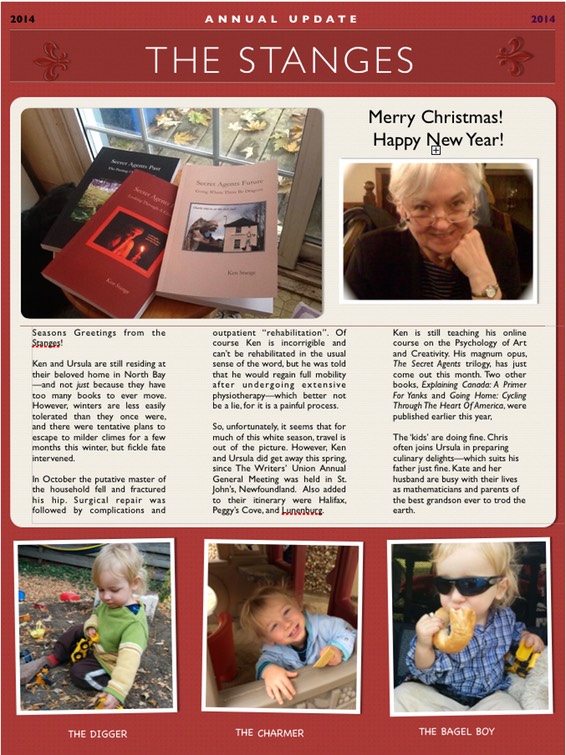"I'd have stopped writing years ago if it were for the money." --Paulo Coelho Link To Blog Archive here.
Your Man Friday’s Ideas: The Joy Of Statistics
Your Man Friday’s Ideas: The Joy Of Statistics
Joy, never mind even pleasure, in statistics?! Seems a ridiculous statement. Most people don’t like math, and apparently statistics is even unpopular among mathematicians. Scientists often have to use statistics, but few seem to really appreciate their beauty, and unfortunately many use them incorrectly. But statistics are beautiful, aesthetically pleasing, sharing with art the ability to let us perceive the world with a new, brighter, and more illuminating light. And that is incredibly useful.
Man Friday links here: http://kenstange.com/manfriday/current-ideas.html
Why I Write
Why I Write
I honestly don’t know. At some point quite early in my life the need to write became as demanding as the need to eat or drink or sleep.
I certainly don’t do it for fame or fortune. I’m not so naïve and foolish as to expect either. I’m sure many people must share this need to write, but simply satisfy it in private, never even considering sharing the results of it with anyone.
I have no idea from whence this intense need arrives. It may be an innate or learned disorder of the emotional centres of the brain, merely an unhealthy exaggeration of the universal need to express oneself.
All I can say is I write because that is just what defines me to myself.
Why I Write Poetry
Why I Write Poetry
I write poetry because I love all the components of language: the sound of it; the meaning of it; and its appearance to a reader.
And what I consider to be poetry is the most effective use of these components: the sound of it; the meaning of it; and the look of it on the page.
It is a challenge and a pleasure to try to use all these components to express most effectively something I’ve decided to write.
Why I Write Poetry Using Scientific Or Taboo Terms
Why I Write Poetry Using Scientific Or Taboo Terms
I do not eschew—in fact love—using scientific and ‘taboo words’ in my poetry. I think they are a largely unexploited resource for the poet.
So called ‘taboo words’ have begun to be used by some poets, most recently by performance poets. Their appeal lies in their power to evoke strong emotions, which is why many people only use them in highly emotional situations, such as banging their thumb with a hammer or losing their temper—or even to express delight. I remember a guy I knew who used to express his delight with making a successful horseshoe throw by yelling, “Beau-tee-fucking-ful!” (Of course, some people trivialize them by using them constantly, even as adjectival filler in their speech, with “fucking” preceding every noun.)
Scientific terms are used less frequently. I have a passion for science (and philosophy). Many scientific terms have a resonance for me and are rich with connotation. I find this especially true of cosmological and neurological terms. For me at least, words such as “dark energy” or “amygdala” are loaded with fascinating and emotional associations.
However, there is no question that using either is risky, because it can alienate many readers. Much of this reaction is based on misconceptions of what poetry is and false beliefs about restrictions that should be put on it. All I can say is, “That’s fucking stupid!”
Why I Do Not Write Poetry About Political Issues
Why I Do Not Write Poetry About Political Issues
I do not write poetry that is explicitly political in content. Some protest poetry can be effective and move me. Where it seems most effective is in quasi-poetic lyrics to popular songs. But often it leaves me cold, even if I share the writer’s sentiments.
I have several reasons.
One is that I happen to have a personal distaste for politics. It’s a nasty business. And people’s political convictions override reason or even rational, unemotional discussion. I have, or course, what could be considered ‘political convictions’, although I consider myself non-partisan and really try to be. They just don’t seem appropriate content for my poetry.
Another reason is that they seem so transitory. The passage of time soon makes them anachronistic and only of historic interest.
The third reason is that most political poems are really bad. Poetry doesn’t seem a suitable genre for their expression. I can certainly appreciate well-written polemic essays, even if I don’t agree with the author. And brilliant satire delights me. These forms are undisputedly important literary creations.
I don’t think politics should just be left to politicians, but writers have better genres to work in if they choose to deal with political issues.
Why I Do Not Write Poetry About Personal Matters
Why I Do Not Write Poetry About Personal Matters
I’m too private a person. I know that poetry since becoming predominately lyrical naturally tends to be personal in nature, but that is different from being autobiographical.
I’m averse to spilling my guts in public, but that doesn’t mean I can’t appreciate poetry that is ‘confessional’. Some of it is great: for example, Sylvia Plath’s poetry. And I know it is a great emotional release valve for many young people who write primarily for their own satisfaction—although rarely are their ‘poems’ really poetry.
I do write about some aspects of my life that are important to me, and I think might be of general interest. I just find genres such as the memoir more comfortable. Two of my books are of this sort. One is my recent book about a cycling trip I took with my son from New Orleans back up to Canada, Going Home: Cycling Through The Heart Of America. Another is a work-in-progress about growing up (and trying to fit in with the other kids) in a rough American neighbourhood, Chicago Days: Growing Up Absurd On The South Side.
Why I Do Not Write ‘Formal’ Or ‘Free’ Verse
Why I Do Not Write ‘Formal’ Or ‘Free’ Verse
I can say this because I only rarely adhere to classic formal verse structures, but nothing I write do I consider ‘free verse’ either.
I certainly have nothing against formal prosodic structures. But the obsession with them that makes people assume they are a requirement of all poetry is misguided.
In fact, most people only assume a poem is following such a structure when it has obvious characteristics such a full end-rhyme or a strong, regular rhythm or neat line breaks. They really have no understanding of prosody. (Shakespeare is said to write iambic pentameter, but scanning his poetry will disabuse one of that idea.)
Many of the traditional, formal structures were borrowed from Latin or Italian, languages very different from English. In Italian, unlike English, rhyme is easy and won’t sound forced. Structures borrowed from French are also inappropriate because it isn’t an accentual-syllabic language like English.
‘Free verse’ is a confusing and only loosely defined term. If it means free of traditional, formal structure, then most of my poetry certainly is ‘free verse’, as is most of the great poetry of the last one-hundred years. If it means having no structure, then I wouldn’t consider it as really poetry, because that would mean it shows no attention to that essential, structural component poetry: the sound of it.
Most contemporary poetry is like jazz, in that it breaks from the traditional rules of ‘classical’ composition, but is amazingly and often subtly structured according to more flexible criteria.
Your Man Friday’s Ideas: Tree Hugging
Your Man Friday’s Ideas: Tree Hugging
Every aspect of nature inspires ideas. (An obvious, specific example is the many ideas for inventions that are based on watching other creatures easily do things we humans can’t, such as fly.) Trees are no exception.
Man Friday links here: http://kenstange.com/manfriday/current-ideas.html
Writers’ Egos
Writers’ Egos
Many people seem to think writers have huge egos. I can’t know for sure, but I don’t think so, and it hasn’t been my experience. I think that many, like me, are actually quite insecure. We may (at least on good days) think what we write is great shit—or we probably couldn’t keep writing. But I don’t know if writers in general think they are especially wonderful human beings.
Certainly many aren’t—and know it.
Self-Promotion Required
Self-Promotion Required
Writers have to believe that what they write is worth reading. But since many are shy and very uncomfortable with self-promotion, they would prefer to have someone else do it, such as their publisher.
If your publisher is a small press, they usually do the best they can. But they just don’t have the resources.
And if you have a major publisher, they use most of their resources to promote known, popular authors or books expected to sell well. These only rarely coincide with literary works.
One can’t find readership if potential readers don’t even know you exist.
So Probably About Time To Plug My Own Books
So Probably About Time To Plug My Own Books
Two new books this year and one each in 2012 and 2013. Very varied but all good stuff—in my humble opinion.
Summer Break Time
Summer Break Time
Enough blogging! Time to go back to working on Chicago Days: Growing Up Absurd On The South Side.

Fickle fate
Fickle Fate
They say you shouldn’t make promises you can’t keep. Well, I blew it! I said I’d be back soon. That was in August! (I suppose I could argue that ‘soon’ is relative.)
Various events kept me too busy to return. One of them was fracturing my hip, followed by surgery, followed by complications, and still ongoing rehabilitation.
A more cheerful reason for my delay is that I switched away from working on Chicago Days: Growing Up Absurd On The South Side to finally completing my magnum opus on creativity: the Secret Agents trilogy. I’d been working on this project for over a decade. It was a major milestone to finally see it to completion and publication.
Secret Agents Past: The Parting Of The Waters
Secret Agents Past: The Parting Of The Waters
Secret Agents Past: The Parting Of The Waters
Having had a longstanding interest in both art and science, I found it odd that those interested in art disliked science, and those with an interest in science often dismissed art as unimportant. This wasn’t always so.
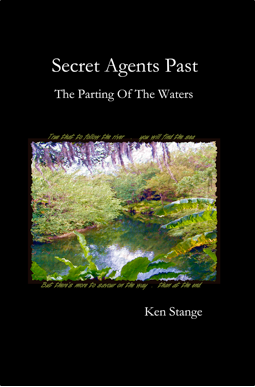
Secret Agents Present: Looking Through A Glass Darkly
Secret Agents Present: Looking Through A Glass Darkly
In this volume I examine more closely the similarities and differences between artists and scientists. In all three volumes of the Secret Agents each chapter ends with a relevant compare and contrast ‘case study’ of an eminent artist and scientist.
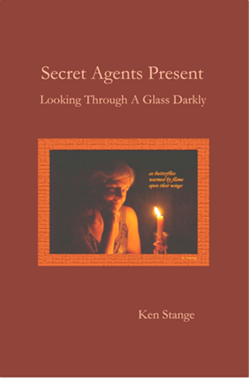
Secret Agents Future: Going Where There Be Dragons
Secret Agents Future: Going Where There Be Dragons
The two cultures are once again coming together, and this is having a profound effect on both art and science. Developments in both endeavours have been exponential. Creative people are always the ones to risk venturing into unknown, and therefore potentially dangerous, territory.

Secret Agents Future: Going Where There Be Dragons
Perfect Epigram For The Secret Agents Trilogy
Perfect Epigram For The Secret Agents Trilogy
I just realized what would have made a good epigram for the Secret Agents series: "The past, the present, and the future walked into a bar. It was tense." —Anon.
Christmas Present
Christmas Present
Christmas is a time for giving gifts. So here!
One can download digital versions (in pdf format, readable on tablets) of these books. Feel free to share copies with friends.
This offer expires January 15, 2015.
Your Man Friday’s Ideas: Theme Real Time TV
Your Man Friday’s Ideas: Theme Real Time TV
Most reality TV isn’t. It’s staged. But surely a lot of its appeal is that it is –at least allegedly—presented in real time. And in real time there is no absolute certainty of what is going to happen. Live TV is largely a thing of the past, and we’ve lost the pleasure of sometimes watching the unplanned happen: e.g., the blooper when the actor falls out of character and bursts out laughing. The huge appeal of even the strangest forms of live TV is demonstrated by these three incredibly popular examples.
Man Friday links here: http://kenstange.com/manfriday/current-ideas.html
Plato’s Heart
Plato’s Heart
One has to categorize one’s books for promotion, and because I like to mix genres, this is always problematic. For example, many of my books combine poetry and prose. So into what pigeonhole does the Secret Agents trilogy best fit? I really don’t know, but It certainly was heavily influenced by philosophy.
Seems my visual art is too. My diptych, “C78-The Philosopher's Ghosts” is in honour of the two founding fathers of Western Philosophy.
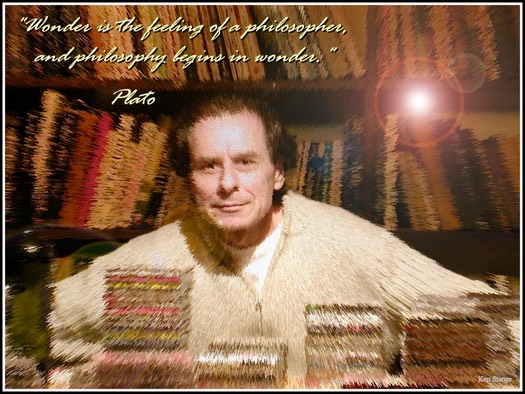
Aristotle’s Head
Aristotle’s Head
Plato seemed to believe that most people were deluded fools, living in a cave and afraid of the harsh light of day. Aristotle knew better than his teacher. And he knew how we get to know something. He formalized the rules of logic and emphasized the importance of observation. And these are the two paths to knowledge; i.e., deduction and induction.
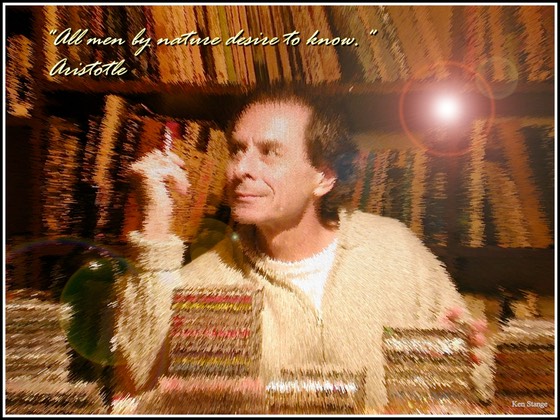
Again Thoughts About Why I Write
Again Thoughts About Why I Write
As the year comes to the end, I wonder about why I’ve spent so much of my life writing. Can’t be the money!


